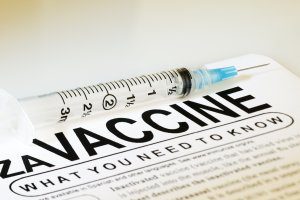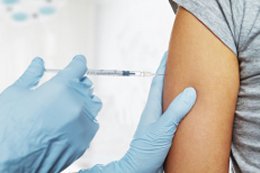 As the 2019-2020 flu season rolls on, the director of the National Institute of Allergy and Infectious Diseases (NIAID) has issued a warning that this year’s flu vaccine has shown limited effectiveness in fighting one of the most-common strains of the flu virus. According to CNN, NIAID director Dr. Anthony Fauci stated that this year’s flu shot, “[is] not a very good match for B/Victoria,” which has become one of the most-prevalent strains this flu season. CNN also reports that, “[c]hildren are particularly susceptible to influenza B/Victoria.” Continue reading
As the 2019-2020 flu season rolls on, the director of the National Institute of Allergy and Infectious Diseases (NIAID) has issued a warning that this year’s flu vaccine has shown limited effectiveness in fighting one of the most-common strains of the flu virus. According to CNN, NIAID director Dr. Anthony Fauci stated that this year’s flu shot, “[is] not a very good match for B/Victoria,” which has become one of the most-prevalent strains this flu season. CNN also reports that, “[c]hildren are particularly susceptible to influenza B/Victoria.” Continue reading
Tag Archives: Guillain Barre Syndrome
You Have Been Diagnosed with a Vaccine-Related Injury or Illness. What Now?
 If you have been diagnosed with Shoulder Injury Related to Vaccine Administration (SIRVA), Guillain-Barre Syndrome (GBS), or another vaccine-related injury or illness, understanding the steps to take following your diagnosis will be critical to your health and your financial stability. The treatment options for certain types of vaccine-related injuries and illnesses are limited; and, in order to recover as quickly and fully as possible, you need to make sure you receive appropriate treatment and avoid mistakes that could have negative long-term consequences.
If you have been diagnosed with Shoulder Injury Related to Vaccine Administration (SIRVA), Guillain-Barre Syndrome (GBS), or another vaccine-related injury or illness, understanding the steps to take following your diagnosis will be critical to your health and your financial stability. The treatment options for certain types of vaccine-related injuries and illnesses are limited; and, in order to recover as quickly and fully as possible, you need to make sure you receive appropriate treatment and avoid mistakes that could have negative long-term consequences.
7 Steps to Take Following a Vaccine-Related Injury or Illness Diagnosis
Here are seven steps you can take to protect your health and your legal rights if you have been diagnosed with a vaccine-related injury or illness: Continue reading
10 Key Facts about Vaccine Injury Claims
 If you have been diagnosed with a vaccine-related injury, including a Shoulder Injury Related to Vaccine Administration (SIRVA), you may be entitled to recover your medical expenses and certain other losses under the National Vaccine Injury Compensation Program (VICP). Here are 10 key facts about filing a claim under the VICP:
If you have been diagnosed with a vaccine-related injury, including a Shoulder Injury Related to Vaccine Administration (SIRVA), you may be entitled to recover your medical expenses and certain other losses under the National Vaccine Injury Compensation Program (VICP). Here are 10 key facts about filing a claim under the VICP:
1. The National Vaccine Injury Compensation Program (VICP) is a Federal Initiative Designed to Protect Individuals Diagnosed with Vaccine Injuries.
The VICP is a federal government program that Congress established in 1988 for the sole purpose of making it easier for individuals diagnosed with vaccine injuries to recover financial compensation. Under the VICP, individuals diagnosed with vaccine injuries can collect money from the government instead of filing a lawsuit against the vaccine manufacturer in court. Continue reading
Understanding the Contraindications and Precautions for CDC-Recommended Vaccinations
 While receiving vaccinations is a safe and effective means for combatting disease, there are certain diseases and medical conditions that can increase an individual’s risk of an adverse reaction or other negative side effects. The Centers for Disease Control and Prevention (CDC) refer to these as “contraindications” and “precautions,” and it advises that:
While receiving vaccinations is a safe and effective means for combatting disease, there are certain diseases and medical conditions that can increase an individual’s risk of an adverse reaction or other negative side effects. The Centers for Disease Control and Prevention (CDC) refer to these as “contraindications” and “precautions,” and it advises that:
“Contraindications (conditions in a recipient that increases the risk for a serious adverse reaction) and precautions to vaccination are conditions under which vaccines should not be administered. Because the majority of contraindications and precautions are temporary, vaccinations often can be administered later when the condition leading to a contraindication or precaution no longer exists. A vaccine should not be administered when a contraindication is present. . . . However, certain conditions are commonly misperceived as contraindications (i.e., are not valid reasons to defer vaccination).”
What Vaccine Recipients Need to Know about AIDP and CIDP
 The risk of being diagnosed with Guillain-Barre Syndrome (GBS) is among the most serious risks associated with flu and tetanus vaccinations. Acute inflammatory demyelinating polyneuropathy (AIDP) and chronic inflammatory demyelinating polyneuropathy (CIDP) are variants of GBS that can have serious – and potentially fatal – consequences. Individuals who receive flu shots and tetanus booster shots should be aware of the symptoms of AIDP and CIDP, and parents should be prepared to seek medical attention at the first sign of either of these vaccine-related illnesses. Continue reading
The risk of being diagnosed with Guillain-Barre Syndrome (GBS) is among the most serious risks associated with flu and tetanus vaccinations. Acute inflammatory demyelinating polyneuropathy (AIDP) and chronic inflammatory demyelinating polyneuropathy (CIDP) are variants of GBS that can have serious – and potentially fatal – consequences. Individuals who receive flu shots and tetanus booster shots should be aware of the symptoms of AIDP and CIDP, and parents should be prepared to seek medical attention at the first sign of either of these vaccine-related illnesses. Continue reading
When is Pain More than Just a Side Effect of a Vaccination?
 “Any vaccine can cause side effects.” While all vaccines recommended for use in the U.S. are considered safe for the vast majority of the population (with exceptions for individuals with certain medical conditions), the Centers for Disease Control and Prevention (CDC) wants vaccine recipients to be aware that certain side effects are possible.
“Any vaccine can cause side effects.” While all vaccines recommended for use in the U.S. are considered safe for the vast majority of the population (with exceptions for individuals with certain medical conditions), the Centers for Disease Control and Prevention (CDC) wants vaccine recipients to be aware that certain side effects are possible.
However, the CDC also warns that, “[a]s with any medicine, there is a very remote chance of a vaccine causing a severe allergic reaction, other serious injury, or death.” Over the past five years, an average of roughly 1,000 people have filed petitions under the National Vaccine Injury Compensation Program (VICP). So, while pain may simply be a side effect of a vaccination, it could also be a sign of a potentially-serious injury, and vaccine recipients should have an understanding of when they may need medical attention and when they may be entitled to compensation under the VICP. Continue reading
What Should You Ask and Tell your Doctor Before You Get Vaccinated?
 While vaccinations are routine procedures that carry strong recommendations from the Centers for Disease Control and Prevention (CDC), they still carry certain risks. Flu shots, tetanus shots, and other CDC-recommended vaccinations are known to cause a variety of injuries and illnesses, and errors during the vaccine administration process can lead to various types of painful and debilitating shoulder injuries. Continue reading
While vaccinations are routine procedures that carry strong recommendations from the Centers for Disease Control and Prevention (CDC), they still carry certain risks. Flu shots, tetanus shots, and other CDC-recommended vaccinations are known to cause a variety of injuries and illnesses, and errors during the vaccine administration process can lead to various types of painful and debilitating shoulder injuries. Continue reading
Can a Vaccination Lead to Wrongful Death?
 While vaccines are crucial to the overall health of the American population, tragically, some people suffer fatal injuries and illnesses as a result of their vaccinations. This is not a problem that can be ignored, and there is no worse result than for a routine vaccination to have such dire consequences.
While vaccines are crucial to the overall health of the American population, tragically, some people suffer fatal injuries and illnesses as a result of their vaccinations. This is not a problem that can be ignored, and there is no worse result than for a routine vaccination to have such dire consequences.
For families who have lost loved ones due to diagnosed vaccine-related medical conditions such as Guillain-Barre Syndrome (GBS) and Acute Disseminated Encephalomyelitis (ADEM), financial compensation is available through the federal government’s National Vaccine Injury Compensation Program (VICP). Filing a claim under the VICP takes the place of filing a civil lawsuit against a hospital or pharmaceutical company, and securing compensation under the VICP is less expensive and usually much quicker than pursuing a traditional wrongful death claim. In fact, since the VICP pays claimants’ legal fees separately from their awards of compensation, you can hire an experienced vaccine attorney to handle your claim at no financial cost to you. Continue reading
Who Should Not Get Vaccinated? Recommendations from the CDC
 Although the Centers for Disease Control and Prevention (CDC) recommends vaccination as the best way to prevent the spread of the flu and other diseases, it also says that certain people should not get vaccinated. Since not getting vaccinated carries obvious risks, anyone who has questions about whether it is safe to receive a particular vaccination should consult their doctor.
Although the Centers for Disease Control and Prevention (CDC) recommends vaccination as the best way to prevent the spread of the flu and other diseases, it also says that certain people should not get vaccinated. Since not getting vaccinated carries obvious risks, anyone who has questions about whether it is safe to receive a particular vaccination should consult their doctor.
The CDC provides specific recommendations for each approved vaccine with regard to the health risks that may outweigh the benefits of vaccination. Generally speaking, however, the types of factors that may lead your doctor to recommend against getting vaccinated include the following. Continue reading
Flu Shot Injuries: Symptoms, Treatment & Compensation
 If you are experiencing pain or other unusual sensations or limitations following a flu shot, these could be symptoms of an illness or injury resulting from your vaccination. Each year, tens of thousands of people are diagnosed with vaccine-related medical conditions, many of them resulting from flu vaccine injections in the shoulder.
If you are experiencing pain or other unusual sensations or limitations following a flu shot, these could be symptoms of an illness or injury resulting from your vaccination. Each year, tens of thousands of people are diagnosed with vaccine-related medical conditions, many of them resulting from flu vaccine injections in the shoulder.
When you make an appointment to have yourself or your children vaccinated, it is important to make sure that you understand potential risks that may be involved. It is also important to make sure you know the steps for pursuing compensation for vaccine injuries. Continue reading
